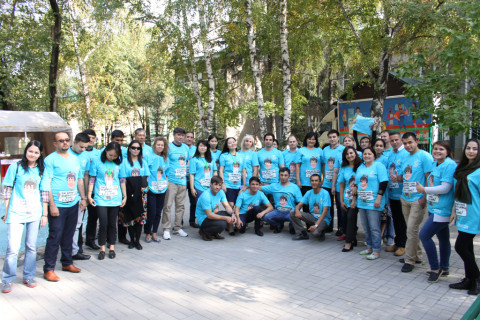
GCED Basic Search Form
Quick Search
현재 위치
Events

Date: September 16 to 22, 2019
Venue: Almaty, Kazakhstan
Today, young people play a significant role in the life of the countries and societies. Young people on the path to growing up are always faced with the need to choose a profession, get a decent education and interesting job, as well as have access to opportunities for self-development in the future. However, whatever professional way a young man chooses for himself, he needs to keep in mind other important goals in his life and the life of society, in which he plans to realize himself.
In September 2015, the UN General Assembly adopted the Agenda-2030 for Sustainable Development and the Sustainable Development Goals (SDGs). One of the important goals is the SDG4: "Ensuring inclusive and equitable quality education and promoting lifelong learning opportunities for all." It is assumed that by 2030, young people will be provided with the opportunity to acquire knowledge and skills necessary for sustainable development, including the promotion of green and healthy lifestyle, human rights, gender equality, culture of peace, global citizenship and understanding of cultural diversity. The full participation of young people in the decision-making process and the implementation of the 2030 Agenda is also important.
In this relation, the regional cooperation can significantly influence not only the achievement of goals set for the countries, but also the effectiveness of the implementation of national development programs and strategies, including using a potential of the younger generation. For the full development of any region, it is necessary to use energy, willingness to change, creativity and innovative way of thinking of young people. In the context of growing globalization, growth of the world's population and the limited natural resources, it is important that young people can make a significant contribution to solving complex problems of world importance.
That is why today, as well as throughout the world, the role of new generation managers in Central Asia is increasing, since young people more often are ready to apply innovative technologies, use acquired skills and competences to jointly search for answers and solutions to global challenges, including environmental ones.
One of the platforms where these important issues related to environmental protection and sustainable development are raised and discussed by young leaders is the Central Asian Leadership Programme (CALP), which, for the tenth year in a row, has been organized by the Regional Environmental Centre for Central Asia (CAREC) in cooperation and with support of its partners. This programme is designed for active, progressive, and eco-friendly youth from middle-level managers, academia, representatives of the private sector, entrepreneurship, and non-governmental organizations (NGOs).
It is noteworthy that the CALP, being the flagship initiative of CAREC, today is the only regular programme to improve environmental capacity for sustainable development in Central Asia, which helps to ensure a comprehensive understanding of environmental protection and sustainable development. One of the principles of the Leadership Programme is “Think globally, act locally, manage regionally!”.
CAREC is implementing this unique program to increase the potential of the leaders of Central Asia, starting in 2010 and to this day. Between 2010 and 2018, about 250 participants completed the Central Asian Leadership Program (CALP). The main goal of the event is to promote the unification of Central Asian youth through the promotion and support of a neutral regional platform. Anniversary CALP in 2019 will be held in an innovative format of active discussions with international experts.
URL:
